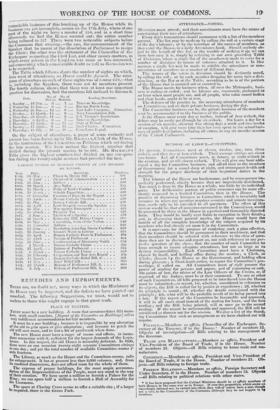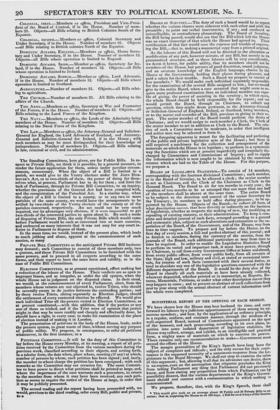DIVISION OF LABOUR-COM)EITTEES.
AT present, Committees meet at eleven, twelve, one, two, three o'clo(k, and they rise at four o'clock. Their average sittings are about two hours. Let all Committees meet, in future, at eight o'clock ire the evening, and sit till eleven o'clock. This will give one hour addl. timed a day for Committee business, and afford time to the members of Government for a sound sleep at night, and consequent health and strength for the proper discharge of their important duties in the morning.
The labours of the House are burdensome, and by consequence im. perfectly performed, chiefly because they are imperfectly distributed. Too much is done by the House as a whole, too little by its individual parts. The deliberative portion of public measures can be more effi- eiently managed in a limited Committee, than in the House. The practice of discussing business in Committee, which is invariably had recourse to when any question requires accurate and minute investiga, tion, needs only to be extended to all questions. The effect of this system would be that all measures canvassed in the Committees, would be presented by ;hem to the House in a perfect and thoroughly digested form. They would be hardly ever liable to exception in their details; and, in discussing their general merits, the House would have the benefit of all the complete knowledge of the subject acquired by its members who had already sat upon it in the Committee.
It is necessary, for the purpose of rendering such a plan effective, that the Committees should be permanent in their machinery, and that their members should be selected with reference to the class of ques- tions they are to discuss arid report on, not with reference to any par- ticular question of the class ; that the number of each Committee be large enough to insure adequate attendance, but not so large as to destroy responsibility. Each Committee must have a Chairman, chosen by itself, and holding office during the session; a Clerk, or Clerks, chosen 1 y the House or the Government, and holding office during pleasure ; a Short-hand-writer, to report the Committee's pro- ceedings, if called on. All Committees must of right possess the power of sending for persons and papers, and of examining on oath. On points of law, the advice of the Law Officers of the Crown, or, if required, of the Judges, must be at their command. To one or other of such Committees, all bills proposed to be intredueed into the House must be submitted-to report, 1st, whether, considered in reference to its objects, the Bill is called for by justice or expediency ; 2d, whether its principle is sound ; 3d, whether the details correspond with the principle ; 4th, what will be the probable result of its being passed into a law. If the report of the Committee be favourable and approved, it will in all eases stand instead of the motion for leave, and the first reading ; and the Bill, being printed, will at once go to the second reading. If the report be unfavourable and approved, the Bill will be considered as thrown out for the session. We give a list of the Stand.. ing Committees that such an arrangement as we have chalked out will require.
FINANCE.-Members ex officio, Chancellor of the Exchequer, Se- cretary of the Treasury, if in the House.* Number of members 12. Objects of investigation-all Bills relating to the management of the Revenue.
TRADE AND MANUFACTURES.-Members ex officio, President and Vice-President of the Board of Trade, if in the House. Number of members 21. Objects-all Bills relating to home trade and Ma. nufaetures.
COMMERCE.-Members ex officio, President and Vice-President of the Board of Trade, if in the House. Number of members 21. Ob... jeets-all Bills relating to foreign trade.
FOREIGN RELATIONS.-Members ex officio, Foreign Secretary and Under Secretary, if in the House. Number of members 12. Objects -all Bills relating to political relations with other states.
* It has been proposed that the Cabinet Ministers should be ex officiis member' of both Houses, in the sense way as in France. If ever this proposition, which seems all exceeding') rational one, be carried into effect, they will of course have a seat, thougia not a vote, in the Committees of the Commons, although they do not happen to bp members. COLONIAL, FIRST.—Members ex officio' President and Vice-Presi- dent of the Board of Control, if in the House. Number of mem- bers 21. Objects—all Bills relating to British Colonies South of the Equator.
COLONIAL, SECOND.—Members ex officio, Colonial Secretary and Under Secretary, if in the House. Number of members 21. Objects .....all Bills relating to British colonies North of the Equator.
DOMESTIC AFFAIRS, Esmusn.—Members ex officio, Home Secre- tary and Under Secretary, if in the House. Number of members 12. Objects—all Bills whose operation is limited to Engand.
DOMESTIC AFFAIRS, 'aim—Member ex officio, Secretary for Ire- land, if in the House. Number of members 12. Objects—all Bills whose operation is limited to Ireland.
DOMESTIC AFFAIRS, SCOTCH.—Member ex officio, Lord Advocate, if in the House. Number of members 12. Objects—all Bills whose operation is limited to Scotland.
AGRICULTURE.—Number of members 21. Objects—all Bills relat- ing to agriculture.
THE CHURCH.—Number of members 21. All Bills relating to the affairs of the Church.
THE ARMY.—Members ex officio, Secretary at War and Paymaster of the Forces, if in the House. Number of members 12. Objects—all Bills relating to the Land Forces of the Kingdom.
THE NAVY.—Members ex officio, the Lords of the Admiralty being members of the House. Number of members 12. Objects—all Bills relating to the Naval Force of the Kingdom.
THE LAW.—Members ex officio, the Attorney-General and Solicitor- General for England, the Lord Advocate of Scotland, and Attorney- General and Solicitor-General for Ireland, if in the House ; with such members as may be most distinguished for their knowledge of jurisprudence. Number of members 21. Objects—all Bills relating to law, criminal or civil, and its administration.



















































 Previous page
Previous page